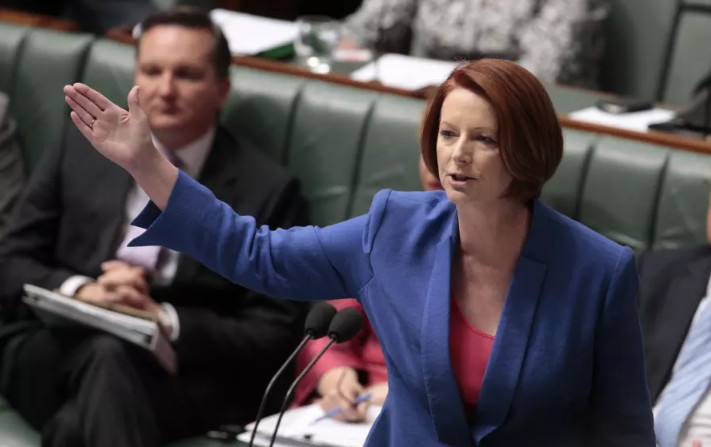
Politics & Society
Julia Gillard: On women

A historical reckoning with Gillard’s misogyny speech forces us to acknowledge there are no heroes – and that’s okay
Published 12 October 2022
This week marks 10 years since former Prime Minister Julia Gillard delivered her famous misogyny speech.
Now synonymous with her legacy, it vaulted Gillard into the stratosphere of global viral content, inspiring hundreds of thousands of women and girls around the world.
As we consider the significance of that moment, there is no need to put the former PM on a pedestal.
Many of the tributes to Gillard this week gloss over the critical context which prompted her to give the speech: Gillard was trying to sink a motion introduced by then Opposition Leader, Tony Abbott, to remove Speaker of the House, Peter Slipper, who had been accused of sexually harassing a staffer.
The scandal surrounding the speaker had been brewing for months, and court proceedings investigating the allegations against Slipper had uncovered text messages he’d sent using vile and misogynistic language.

Politics & Society
Julia Gillard: On women
Gillard rose in righteous anger to call out Abbott’s sudden, politically opportunistic stance against misogyny in parliament; but she was being politically expedient herself, protecting a man who stood accused of sexual harassment and misogyny to shore up her government’s razor thin majority in the House of Representatives. In the moment, the speech worked – Abbott’s motion was defeated by 70-69 votes.
But Slipper resigned the next day, and the allegations against him were later found to have merit. With the benefit of hindsight and what we’ve learned in recent years since #MeToo about entrenched workplace sexism, harassment and abuse, the origins of the Gillard misogyny speech should make us deeply uncomfortable at best.
As is so often the case, when one looks closely and critically at the historical record, there are no perfect heroes.

And that’s okay because there is still a feel-good story here; it’s one about how far societal attitudes have come in the space of just a decade.
Ten years ago, there was widespread tolerance and active coverups of sexual harassment and sexual assault in institutions and workplaces all over the world. The global movement to call out harassment and expose abuses of power has created unprecedented space for survivors to come forward and seek justice.
This reckoning with misogyny is far from over, as the current trial of Bruce Lehrmann who stands accused of raping Brittany Higgins in parliament underscores.

Politics & Society
Regenerating political leadership in a populist age
Undoubtedly, Gillard’s speech played an important role opening up the conversation about sexist and misogynistic treatment faced by female politicians and leaders everywhere.
The speech clearly struck a nerve with women all over the world, tapping into a collective, deep, simmering anger over the persistent misogyny they face despite decades of gains by the feminist movement. Gillard personified an explosion of that simmering anger.
After years of silently enduring sexist attacks and deliberately trying to sidestep discussion of her gender for fear of backlash, the liberation she must have felt as she broke her silence and unleashed on Abbott, who had been behind so many of the sexist attacks on her, was palpable.

In giving herself the license to finally confront the vile and misogynistic treatment she had faced, Gillard’s spontaneous speech in parliament created a cultural touchstone that contributed to a rapidly growing conversation online which questioned and called out the treatment of women in public life and spurred the #MeToo movement.
As the speech went viral, it quickly became stripped of its original context in which Gillard was attempting to protect Slipper’s hold on the speakership.
All that mattered to audiences across the world, unfamiliar with the complex machinations of Australian politics, was that it felt good to see a female politician school a conservative, sexist politician.

Politics & Society
Sexism, women and Australian politics
Both Gillard and Abbott became caricatures, each representing a familiar gendered dynamic in political contexts all over the world.
But if we put Gillard’s speech back in its original context, how can we reconcile her own complicity in the Slipper affair with the reckoning her speech prompted? Instead of putting Gillard on a pedestal, we could recognise that she was a product of her time.
She had navigated the male-dominated world of politics to become Australia’s first female prime minister, and like any other politician, she had made numerous compromises and political calculations along the way – especially on women’s issues and gay marriage.
In navigating the often-misogynistic culture of parliament, Gillard sometimes played into it, and at other times used her platform to call it out.
She was an imperfect politician navigating, to put it mildly, an imperfect world.
Banner: Andrew Meares/Fairfax